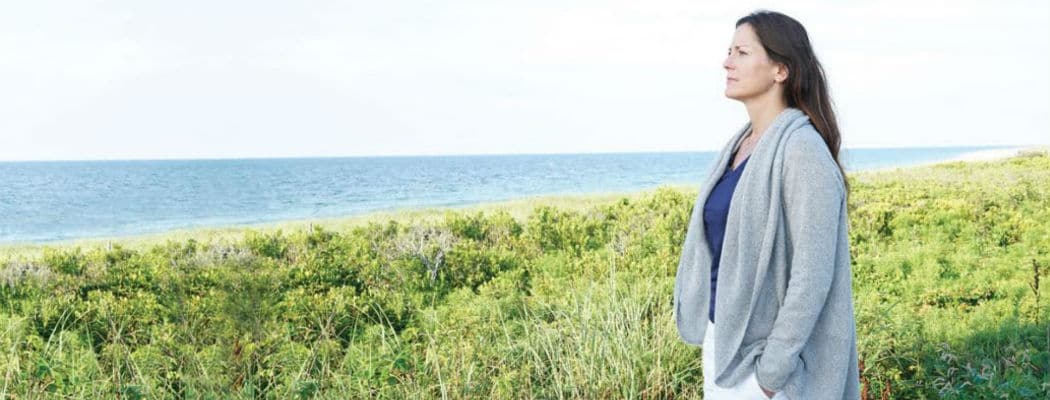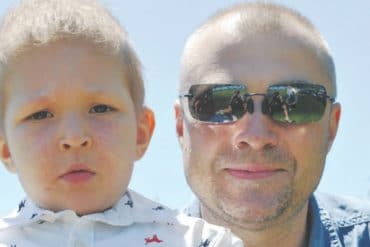Ending the stigma around mental illness on Nantucket.
I have grappled with bouts of anxiety and depression for most of my adult life. The majority of that time, I never uttered a word about it to anyone. Instead, I’d isolate myself and try to think my way out of the way I was feeling. I’d reason and plead with myself that I had no right to feel depressed. After all, I was healthy, came from a good family, loved my job, had loyal friends. I mean, I lived on Nantucket — how could I possibly be depressed? But no matter how much brainpower I flexed, no matter how much logic I threw at it, nothing could deliver me out from the dark shadow I routinely found myself in. I eventually decided that all I could do was wait it out, like a boat beached in the shallows waiting for the tide to come in and lift it up again.
One out of every five Americans experiences anxiety, depression, or other forms of mental illness. As far as Massachusetts is concerned, the Cape and the islands are hit particularly hard. Despite the fact that it’s a medical condition not unlike diabetes or cancer, mental illness comes with the added symptom of societal stigma, which prevents many people from seeking out care. That can be especially the case for a well-off community like Nantucket, where living on an island paradise is antithetical to the idea of suffering.
 “Mental illness is like any other illness,” says Jackie Lane, the executive director of the National Alliance of Mental Health (NAMI) for Cape Cod and the Islands. “And mental illness does not discriminate.” In fact, recent studies have shown that suicide rates in affluent communities have steadily been on the rise. In recent years, Nantucket has lost a number of long-standing community members. With each tragedy comes the collective shock of discovering the level of suffering happening silently just below the surface.
“Mental illness is like any other illness,” says Jackie Lane, the executive director of the National Alliance of Mental Health (NAMI) for Cape Cod and the Islands. “And mental illness does not discriminate.” In fact, recent studies have shown that suicide rates in affluent communities have steadily been on the rise. In recent years, Nantucket has lost a number of long-standing community members. With each tragedy comes the collective shock of discovering the level of suffering happening silently just below the surface.
Nantucket resident Kate Kling experienced that revelation two years ago when her phone rang early one morning with her sister Christine on the other line. “She was three years older than me, married, had three beautiful daughters, and lived in Connecticut,” Kling says, “so from my point of view, everything was fine.” But in the course of their conversation, Kling learned that Christine had been struggling on and off with depression. Now she felt as though she was spiraling out of control. “It was almost like a virus had overtaken her brain, and she was a different person,” Kling says. “She hid her depression because the stigma exists.”
When Kling’s sister revealed that she was feeling badly about herself and had thoughts of suicide, her parents admitted her to the hospital. “Mental illness is such a devastating disease because it is invisible,” Kling says. “My sister suffered in silence for years, which is so heartbreaking to me. I wish more than anything she could have shared her struggles sooner so our family could have understood her illness better, gotten her the right medical care, and supported her more.” Tragically, after being in and out of the hospital, Christine took her life.
Writing her obituary in the funeral parlor, completely devastated and distraught, Kling and her family struggled to come to terms with Christine’s loss. If only they could have learned about her suffering sooner, they thought. “We manage heart disease, we manage diabetes, why can’t we learn to manage and talk about mental illness?” Kling says. “Because if my sister talked to me about it, if she talked to her husband about it, we would have figured this out. But she was embarrassed and ashamed.”
 Kling and her family asked that in lieu of flowers, people donate to NAMI, the country’s largest grassroots advocacy organization dedicated to helping those affected by mental illness and fighting to end the stigma around it. When she returned home to the island, Kling continued to channel her sorrow into supporting NAMI on Nantucket by creating a fundraising event in honor of her sister, called Dragonfly. “My sister always loved dragonflies and I learned they are a symbol of change,” Kling explains. “I thought it was fitting since my goal with the fundraiser is to inspire change with mental illness.” The event was held last September and raised over $60,000 for NAMI on Nantucket, enabling the organization to expand its vital services to islanders.
Kling and her family asked that in lieu of flowers, people donate to NAMI, the country’s largest grassroots advocacy organization dedicated to helping those affected by mental illness and fighting to end the stigma around it. When she returned home to the island, Kling continued to channel her sorrow into supporting NAMI on Nantucket by creating a fundraising event in honor of her sister, called Dragonfly. “My sister always loved dragonflies and I learned they are a symbol of change,” Kling explains. “I thought it was fitting since my goal with the fundraiser is to inspire change with mental illness.” The event was held last September and raised over $60,000 for NAMI on Nantucket, enabling the organization to expand its vital services to islanders.
Ruth Blount is the program coordinator for NAMI on Nantucket and has had her own journey with mental illness. Five years ago, Blount discovered that one of her children suffered from schizoaffective disorder. “I was completely unprepared,” she says. “I had no idea what was wrong. I had no idea what to do. I was basically traumatized with heartbreak, fear, and the agony of not knowing what to do.” Blount’s therapist suggested connecting with NAMI Cape and the Islands, which was planning on bringing its Family-to-Family program to the island in nine months. Blount called NAMI and said, “We need the program right now; what can I do to help?”
NAMI’s Family-to-Family program is a free, twelve-session course for family members of individuals with mental illness. What makes the program uniquely impactful is that it’s not run by clinicians or therapists, but rather by laypeople who have had experiences with mental illness in their family. “The day that I met another mother with a child with schizophrenia, that’s the day my healing started,” Blount says. “I had heard lectures by doctors and clinicians, I had read books and articles, but it was in meeting another person who had traveled the same journey that I felt hope.” After going through the course and recognizing the great need for Family-to-Family on Nantucket, Blount joined other islanders in receiving training to conduct the course herself. NAMI on Nantucket has since expanded to offer a robust lineup of programs, including a new support group dedicated to Kate Kling’s sister, Christine. The Dragonfly Emotional Wellness Group was made possible by the significant funding raised by last year’s Dragonfly event. With a therapist present, the peer-driven group meets twice a month in the fall and is open to anyone facing all levels of behavioral health and recovery challenges.
 “I feel so grateful to Dr. Richard Ross [the therapist who monitors the sessions] and Ruth Blount for working to create the Dragonfly Emotional Wellness Group,” says Kling. “It is a very heartwarming tribute to Christine, knowing the group will offer a safe place for people and their families to share their struggles, learn about resources, and know they are not alone.”
“I feel so grateful to Dr. Richard Ross [the therapist who monitors the sessions] and Ruth Blount for working to create the Dragonfly Emotional Wellness Group,” says Kling. “It is a very heartwarming tribute to Christine, knowing the group will offer a safe place for people and their families to share their struggles, learn about resources, and know they are not alone.”
Indeed, knowing you’re not alone is a powerful step toward recovery. A tremendous weight is lifted off those who struggle with mental illness and behavioral health when they can openly voice their troubles without fear of judgment. When the stigma is dissolved and mental health is brought out from the shadows, more people will be able to seek out the vital help provided by organizations like NAMI. Instead of waiting for the tide to pick them up off the shallows, others can help push them back to sea. But the power to spur change also rests in the hands of those who suffer in silence—because the more we share our stories, the more we can help others understand just how deep this disease runs.
This year’s Dragonfly event will take place at the Nantucket Hotel on September 21st from 5:30 to 8:00 p.m. For more information on services on Nantucket, click here. To purchase tickets or donate to the Dragonfly Fundraiser, click here.






